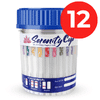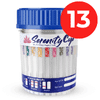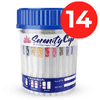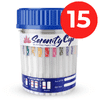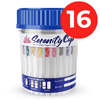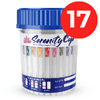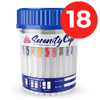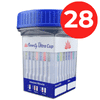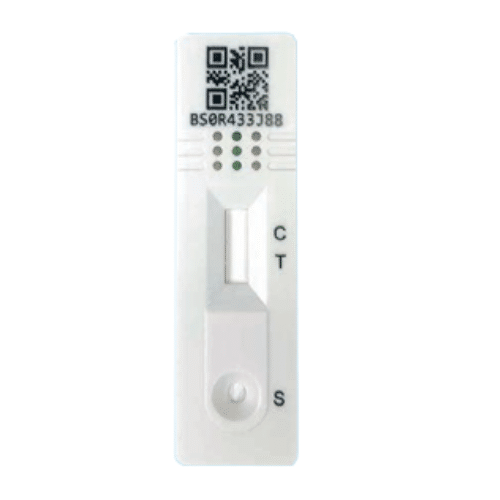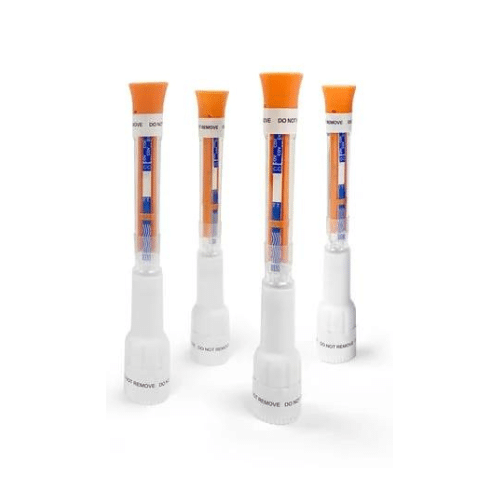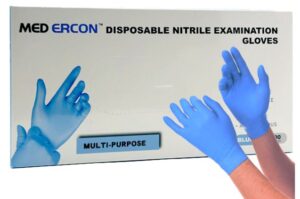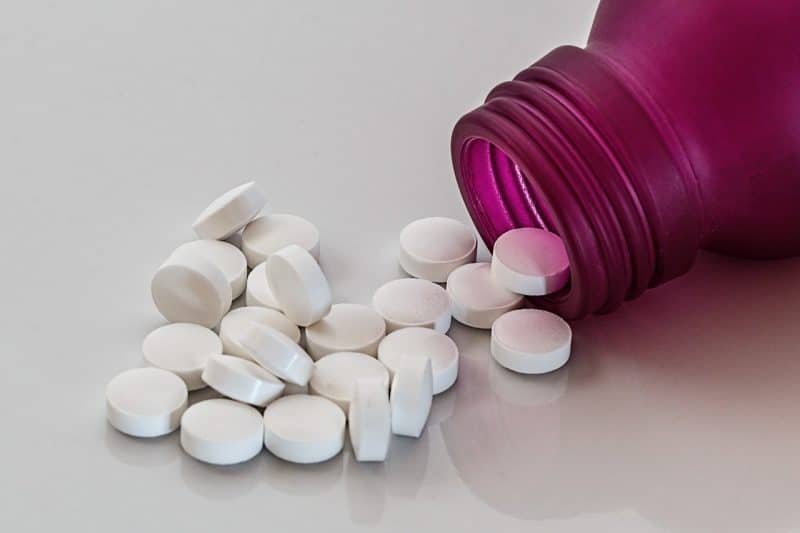Cyclobenzaprine is one of the top 50 prescription drugs in the US. It is a muscle relaxant in alleviating pain, tenderness, and mobility issues due to muscle spasms. Due to its popularity, some people wonder – Can Cyclobenzaprine be detected in a 12-panel drug test? Read on to know Does Cyclobenzaprine Show Up on a 12 Panel Drug Test?
How Quickly Does Cyclobenzaprine Take Effect?
Cyclobenzaprine is available in multiple forms, including immediate-release tablets of 5, 7.5, or 10mg, as well as extended-release tablets of 15 or 30mg.
When taken as an immediate-release tablet, many users experience noticeable muscle relaxation and pain relief within 20 to 30 minutes after consumption. This makes it a suitable choice for quickly alleviating muscle spasms.
For those using the extended-release version, the medication is designed to release gradually, providing longer-lasting effects to help manage symptoms throughout the day. Though the onset might not be as rapid as the immediate-release forms, the benefits are sustained over a more extended period.
Always consult a healthcare professional to determine the appropriate form and dosage for your specific needs.
Amrix, Fexmid, Flexeril, and FusePaqTabradol are the most common Cyclobenzaprine brands. It blocks nerve impulses or pain sensations that are sent to the brain.
More importantly, it does not take the place of rest, exercise, physical therapy, or other treatment that doctors recommend. Besides, it is intended for short-term use. Doctors typically prescribe it for up to two or three weeks.
Do Muscle Relaxers Show Up On a 12 Panel Drug Test?
Muscle relaxants, including commonly used drugs, are not typically detected in a standard 12-panel drug test, as these screenings primarily target controlled substances like marijuana, amphetamines, opioids, benzodiazepines, and others. Even though muscle relaxants do not usually appear on such tests, they can be detected through specific tests. For instance, Flexeril can be found in urine for 4 to 14 days, in blood for up to 10 days, and in saliva for 3 to 10 days. It’s important to note that the duration of the drug’s presence in the system can vary based on factors such as age, sex, body mass, metabolic rate, genetics, health condition, frequency of administration, dosage, and co-administered drugs.
How Quickly Does Cyclobenzaprine Take Effect?
Cyclobenzaprine is generally prescribed to relieve muscle spasms and is available in both immediate-release and extended-release forms. The immediate-release tablets typically come in doses of 5 mg, 7.5 mg, or 10 mg, while the extended-release capsules can be found in 15 mg or 30 mg strengths.
Onset of Action
For immediate-release tablets, users often start to feel relief from muscle spasms within 20 to 30 minutes of taking the dose. This makes it an effective option for quick relief when muscle pain is sudden and severe.
Extended-Release Option
On the other hand, the extended-release versions are designed to provide a more gradual effect, maintaining consistent relief throughout the day. This option is particularly useful for those who need ongoing management of their symptoms and prefer not to take medication multiple times daily.
Understanding how quickly cyclobenzaprine can begin working is crucial for those managing muscle pain and spasms, allowing them to plan their daily activities more effectively.
How Long Do the Effects of Flexeril Last?
The duration of Flexeril’s effects depends on the type of formulation you take. Here’s a breakdown:
-
Immediate-Release Tablets: These typically provide relief for around 4 to 6 hours. They are designed for quick action but may require dosing several times a day for sustained effect.
-
Extended-Release Formulation: This version works over a longer period, with effects lasting up to 24 hours. It’s suitable for those who need all-day relief without frequent dosing.
Consider your specific needs and consult with a healthcare provider to determine which formulation might be right for you.
Safely Eliminating Flexeril from the System
Removing Flexeril (Cyclobenzaprine) safely from your system is crucial if you experience adverse effects or need to discontinue its use quickly. Here’s how you can manage this process effectively:
1. Consult a Healthcare Professional
- Seek Guidance: Before taking any action, consult with a healthcare provider. They can offer valuable insights and create a plan tailored to your needs.
- Medical Evaluation: A thorough medical evaluation might be conducted to assess your condition and determine the best course of action.
2. Consider a Detox Specialist
- Specialized Support: Engaging with a detox specialist can provide you with specialized support. These professionals can guide you through detoxification safely.
- Customized Detox Plans: A detox specialist can develop a personalized detox plan that considers individual differences and medical history.
3. Be Aware of the Variables
- Individual Factors: How long Flexeril stays in your system can vary based on several factors, including metabolism, age, liver function, and dosage.
- Safe Tapering: Professionals may recommend a gradual tapering of the medication to minimize withdrawal symptoms and other risks.
4. Understand Potential Side-Effects
- Stay Informed: Being aware of potential side effects, such as drowsiness, dry mouth, or dizziness, can help you manage symptoms effectively.
- Monitor Symptoms: Keep track of any unusual symptoms and report them to your healthcare provider promptly.
5. Natural Detoxification Practices
- Hydration: Drinking plenty of water can support your body’s natural detoxification processes.
- Healthy Diet: Eating a balanced diet rich in fruits and vegetables may aid in flushing out toxins.
- Exercise: Regular physical activity can enhance circulation and promote overall well-being.
6. Regular Follow-Ups
- Ongoing Monitoring: Regular check-ins with your healthcare provider can help monitor your progress and ensure that the detoxification process is proceeding safely.
By following these steps, you can create a safe path to removing Flexeril from your system. Always prioritize safety and seek professional advice for the most effective outcomes.
Side effects of taking Cyclobenzaprine
Taking Cyclobenzaprine may cause the following side effects.
-
-
- Blurred vision which results to inability to see fine detail
-
- Dizziness, drowsiness, or lightheadedness
- Dryness of the mouth or xerostomia
Less common or rare side effects
-
-
- Abdominal bloating, indigestion, nausea or vomiting
-
- Malaise or general feeling of being unwell
-
- Tiny muscle contractions in the body
-
- Numbness, tingling, pain, or weakness in hands or feet
-
- Unpleasant taste sensations
How long Cyclobenzaprine stays in your body
On average, Cyclobenzaprine is detectable in your body within the periods listed below:
- Blood – up to 3 days
- Saliva – up to 36 hours
- Urine – up to 8 days
- Hair Follicle – up to 90 days
Cyclobenzaprine has an average elimination half-life of 18 hours. The half-life of any drug refers to the time it takes for the plasma concentration of the drug to reduce to half of its original value. This metric helps estimate how long a particular drug stays in your body.
Impact of Drug Dosage
The dosage of Cyclobenzaprine you take plays a significant role in determining how long it remains in your system. A standard dosage is 5mg taken three times a day. However, if your dosage is increased to 10mg thrice a day, it can lead to slower elimination. This is because a higher dosage means the drug’s potency and the total amount of medication in your body have essentially doubled, requiring more time for complete removal.
Factors Affecting Elimination
It’s also important to note that various factors can influence how quickly Cyclobenzaprine is eliminated from the body:
- Age and Liver Function: Older individuals and those with impaired liver function may experience a slower rate of elimination.
- Metabolism and Body Weight: A faster metabolism and higher body weight can speed up the elimination process.
- Usage Patterns: Frequent use or higher amounts of the drug can slow down the removal process, extending how long it stays in your system.
Understanding these factors alongside your dosage can provide a clearer picture of how Cyclobenzaprine behaves in your body, helping you manage its use more effectively.
1. What is the relationship between dosage and drug potency?
As the dosage increases, the potency of Cyclobenzaprine also rises. This heightened potency contributes to a slower elimination rate, as the body takes more time to process the larger amount of the medication.
2. What are the common dosages of Cyclobenzaprine, and how do they compare in terms of drug elimination?
The typical dosage is 5mg taken three times a day. In contrast, a higher dosage, such as 10mg taken three times daily, is eliminated more slowly from the body because of the increased total amount of the drug.
3. How does a higher dosage of Cyclobenzaprine affect its retention in the body?
A higher dosage results in the drug remaining in the body for an extended period. This is due to the increased potency and the larger quantity of medication being processed.
Can Cyclobenzaprine be abused or misused?
In general, Cyclobenzaprine is non-addictive. However, it has a high probability of being abused with other extreme drugs. This drug depresses the central nervous system, and some people find these effects desirable, which can lead to misuse.
For instance, someone might abuse Flexeril to feel relaxed, mildly euphoric, or sedated. Used in high doses, Flexeril produces a variety of anticholinergic effects, altering brain neurotransmitters’ activity.
Why test for Cyclobenzaprine
The reasons for doing drug testing on Cyclobenzaprine are now apparent.
First, the National Institute on Drug Abuse reports that people ages 18 to 25 abuse Flexeril. Many of them use Cyclobenzaprine with other drugs to intensify alcohol, cocaine, and other drugs.
Second, the chronic use of Cyclobenzaprine can turn into an addiction. Tolerance can lead to physical dependence. Withdrawal symptoms ensue as a result of quitting.
Check out these symptoms of Flexeril addiction and abuse.
-
-
- Takes more than what a doctor prescribes
-
- Requires more of the drug to achieve the initial effect
-
- Combines Flexeril with other drugs or alcohol
-
- Continues to use Flexeril despite adverse consequences.
-
- Misses out on work, school, or social activities due to drug use
-
- Takes Flexeril for nonmedical reasons
-
- Tries to quit using Flexeril or cuts back on usage but resumes using
-
- Uses Flexeril to come down from stimulants such as cocaine, amphetamine, etc.
-
- Has difficulties with relationships as a result of Flexeril use
-
- Gets into legal trouble due to the use of Flexeril
-
- Has a financial problem due to the use of drugs
- Uses the drug in dangerous conditions, such as while operating a motor vehicle
Does Cyclobenzaprine Show Up on a 12 Panel Drug Test?
Now, we’re ready to answer the question we posed at the start of this blog. “Will Cyclobenzaprine be detected in a 12-panel drug test?”
No. This drug is a muscle relaxant so it doesn’t show up on a 12 panel drug test. The drug test would have to specifically test for the presence of Cyclobenzaprine.
A standard drug screening checks on the following substances:
-
-
- Amphetamines
-
- Barbiturates
-
- Benzodiazepines
-
- Buprenorphine
-
- Cocaine
-
- Ecstasy
-
- Marijuana
-
- Methadone
-
- Methamphetamine
-
- Morphine
-
- Oxycodone
- Tricyclic Antidepressants
However, patients who take Cyclobenzaprine can trigger a false positive result for Tricyclic Antidepressants (TCAs). It’s because this drug is structurally and pharmacologically related to the tricyclic antidepressants.
Additionally, it is not an antidepressant and it does not have the same cardiac toxicity as the TCAs. There is little evidence that cyclobenzaprine causes liver injury.
Check out the 12 Panel Now store for top quality, best-priced drug testing supplies.






